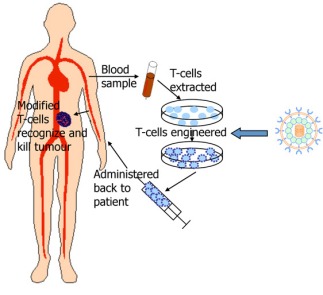
Only 100 years ago we used leeches to treat infections and mercury to cure syphilis. Today, if a doctor tried to administer mercury or attach leeches to a patients arm, the doctor would be sued for malpractice. In another 100 years we’ll look back at chemotherapy and radiation in the same way: archaic.
Conventional cancer treatment will be phased out of our medical system sooner than we think and a more targeted treatment, cell therapy, will take its place. Immunotherapy, a form of cell therapy, harnesses the power of the immune system to identify and destroy cancer cells. While the New York Times calls this treatment a “daring new therapy,” immunotherapy has been in the works since the 1970’s when doctors attempted to inject immune cells, harvested from pigs, into patients (which set off a violent immune system reaction). While this treatment seems promising we are overlooking one important thing: we can never be certain that our immune system will accept the genetically modified version of our own cells.

The good news is that researchers made a left turn and are now heading down a much more interesting path. In fact, researchers are taking a page from eastern medicine (it’s about time). Eastern medicine is more comprehensive when treating cancer; the goal is to enhance the immune system in order to identify cancer cells as well as create an alkaline environment in which cancer cells cannot survive. Alternative cancer treatments, similar to immunotherapy, take an indirect approach to treating cancer; allowing the body to heal itself.
We don’t understand how this treatment will affect the immune system in the long term. It seems that the cancer could easily resurface once the treatment is stopped. One thing is for sure: cell therapy is going to make Big Pharma a lot of money.
Evolving the Cancer Lingo
Battle. Fight. Kill. Conquer. Survivor.
Have you noticed that we use violent, wartime rhetoric to describe our experience with cancer?
In 1971 President Nixon declared a “war on cancer.” 40 years later the metaphor remains permanently entrenched in our minds. Cancer patients are enlisted in a battle against their own bodies. Medical professionals are praised as the unsung heroes. The treatment portrayed as machine guns and nuclear weapons.
Cancer is not a radical Islamic terrorist group or Nazi Germany. When we decide to fight cancer we are waging a war against our own bodies. It’s time to start acknowledging cancer as a survival adaptation instead of an evil invader. Rather, if we treat cancer as an injury to the body, we have a better chance at recovering from cancer. While these metaphors may encourage patients to continue with their treatment, the violent terminology stifles any opportunity for the use of alternative treatments.
How Does Immunotherapy Work?
Immunotherapy has been performed on hundreds of patients. That’s right, only hundreds. The reason is that immunotherapy only works for certain types of cancer, specifically B-cell lymphoma and leukemia. The most common types of cancer, such as malignant tumors, does not respond to the treatment (yet).

T-cells are the stars of the show in this treatment. T-cells are a specific type of immune cell that circulate throughout the body, scanning for invaders. Our bodies produce thousands of cancer cells everyday. T-cells are generally excellent at detecting and eradicating cancer cells. However, cancer cells are sneaky and are capable of escaping the immune response. Eventually, T-cells recognize cancer cells as a normal cell. This is how cancer cells are able to divide and grow into a tumor.
Researchers are focused on two types of cell therapy. The first type of therapy focuses on re-engineering the patient’s T-cells to recognize cancer cells. Extracted T-cells from the patient are programmed in the lab to recognize a protein sequence unique to the cancer cell. The re-engineered T-cells are infused back into the patient. This type of cell therapy has proven useful for patients with deadly forms of leukemia and lymphoma. TBD if it’s useful for other cancers as well.

The second type of cell therapy is not individually tailored to the patient, however, it is more commonly used. Cancer cells are capable of turning off checkpoints that inhibit T-cells from identifying cancer cells. Checkpoint inhibitors drugs block the mechanism that cancer cells use to avoid immune system defenses. These drugs free the T-cells to do their job. A single T-cell can eradicate thousands of cancer cells (a little battle terminology for you). So far, four checkpoint inhibitor drugs are approved by the FDA. These drugs have been successful in treating lung, kidney, bladder and neck cancer.
Chemotherapy will still be part of the equation. Chemotherapy is used to destroy as many tumor cells as possible before immunotherapy treatment.
When is Immunotherapy Dangerous?
Recently, a trial was halted because 3 patients died of brain swelling.
In its beginning stages, this treatment shows great promise. The FDA will be quick to get these drugs on the market before we fully understand the long term ramifications. Immunotherapy has already come with a host of side effects. Some of them are more scary than others: liver shutdown, pancreatitis, colitis, memory loss, seizures, death, etc. The problem is that these symptoms indicate that the treatment is working! The side effects are then treated with immune suppressing drugs… huh?
The biggest risk I foresee is the development of an autoimmune disease. These genetically altered T-cells are not completely our own. The genetically engineered T-cells multiply uncontrollably within our body, which may mean trouble if our immune system does not accept them. Researchers are also having a tough time finding a protein sequence that is exclusive to cancer cells. T-cells are re-engineered to recognize a protein sequence found in cancer cells, however, these sequences are rarely unique among human cells. It would be a disaster if the T-cells were programmed to attack our own tissue.
Another thing is, how do we know that the cancer cells won’t adapt and become resistant to the re-engineered T-cells? It seems likely that the cancer cells will regenerate because our body doesn’t naturally produce the re-engineered T-cells.
The truth is that there are less toxic ways to fight cancer. Alternative treatments are not always accessible, affordable or legal in this country. I find this website to be the best resource to learn about alternative cancer treatment… The Truth About Cancer
Is Immunotherapy a Win-Win for Big Pharma and the Patient?
 As of now, Novartis, a Swiss pharmaceutical company licensed the rights to a recently developed cell therapy drugs.
As of now, Novartis, a Swiss pharmaceutical company licensed the rights to a recently developed cell therapy drugs.
This treatment is not currently affordable: we are looking at hundreds of thousands of dollars! We are willing to spend hundred of thousands of dollars for a treatment that will either kill us or cure us yet we can’t spend an extra dollar on organic produce to prevent cancer? This is bewildering.
We are deeply afraid of cancer but we shouldn’t be. Cancer doesn’t have to be a death sentence. Alternative medicine has been effectively curing cancer for years. Recovering from cancer necessitates a more comprehensive treatment than what is being prescribed. We must incorporate diet changes, detox regimens, exercise programs, oxygen therapy, herbal remedies, and super foods. Even though conventional medicine advertises the one pill wonder, a cure-all does not exist. A doctor’s prescription pad should read more than just a drug name.
 Though alternative treatments are being swept under the rug due to greed and corruption, the future is bright for cancer treatment. Immunotherapy is opening the door for alternative treatments that take the same approach to cancer. We can look forward to higher survival rates and more humane treatments in the future. So hang tight!
Though alternative treatments are being swept under the rug due to greed and corruption, the future is bright for cancer treatment. Immunotherapy is opening the door for alternative treatments that take the same approach to cancer. We can look forward to higher survival rates and more humane treatments in the future. So hang tight!



Interesting.
LikeLike
Pingback: Colitis Treatment In Ayurveda
Your blog is really so knowledgeable… Glad that i could pass by this blog … 🙂
Would like you to visit mine and give your honest feedback .. And do follow 🙂
https://oaktalesblog.wordpress.com/blog/
LikeLike
Great article. This is a very personal topic for me. The immuno-therapy is indeed big news. Most of us heard of President Carter cured from his terminal cancer by it. But you have to be very very careful with that ‘go vegan’ – cure cancer wagon. I know a researcher at Sloan Kettering and we had a good discussion about this. By the way, doctors now recommend antioxidant-rich diet _together_ with the poison the body, healthy tissue will recover, cancer will not, therapies (chemo, radiation), since it certainly doesn’t hurt. But… You can say ‘conspiracy’ as many times as you want, there is not a single clinical case of cancer going away after switching diets. Most of the ‘evidence’ is anecdotal, and when the eager researchers tried to followed up on those cases, in 100% of the cases it turned out either, “I had a mass, even have X-rays to prove it, but it never got biopsied, so I cannot be certain if it was cancer, infection, or a cyst.” Or outright magical thinking as in, “Oh, I never really had anything, but I know a guy who knows a guy… And the word must get out there! That’s why I’m lying for a good cause. I want to give the suffering people the help they need and screw the establishment in the process!” Most of the people in the research field are not there for the money, they are usually there because of deeply personal reasons. If they happen to make money doing that, that’s fine, but if you think for a second that my friend who lost both of his parents to cancer would sit on the cure for a heartbeat, you are mistaken…
LikeLike